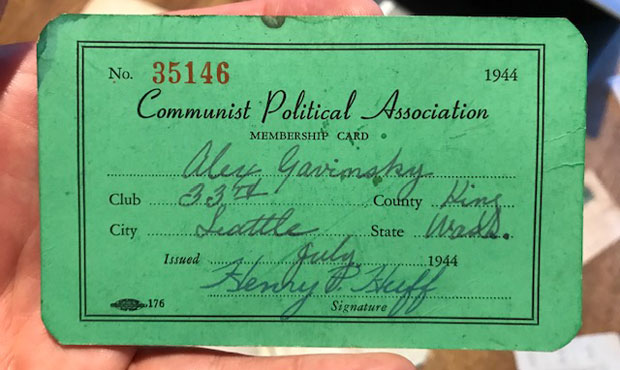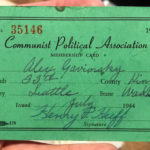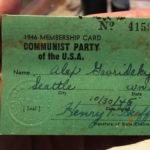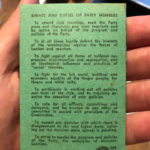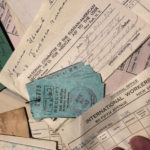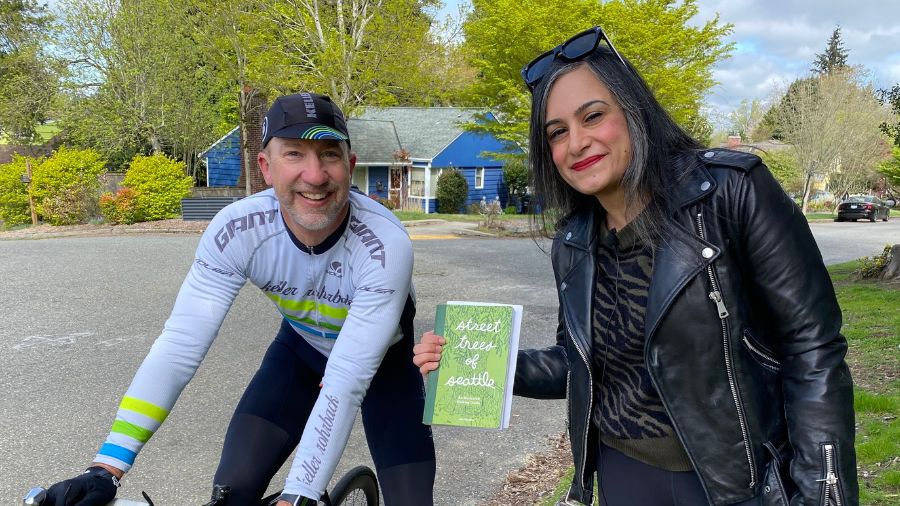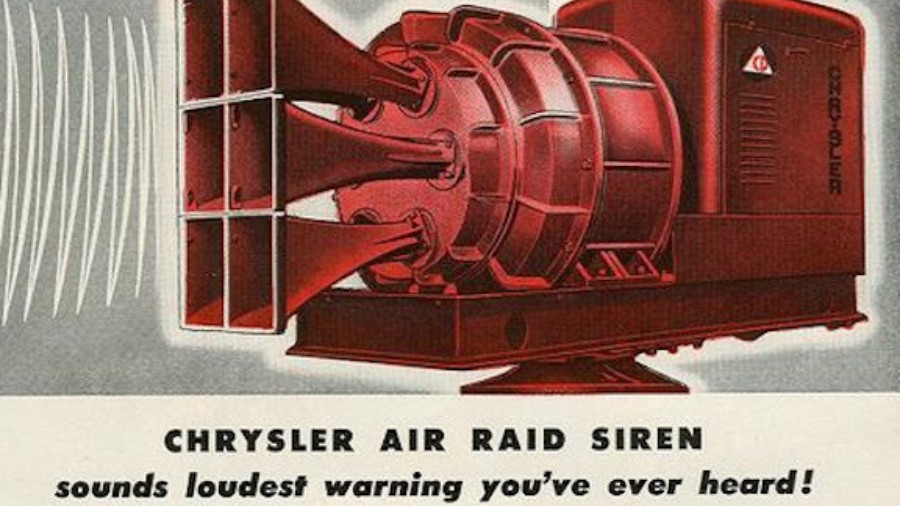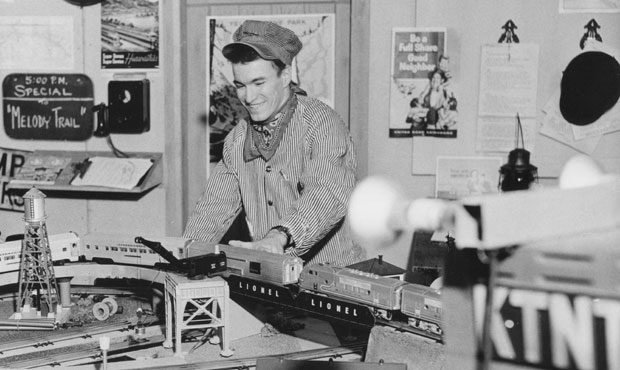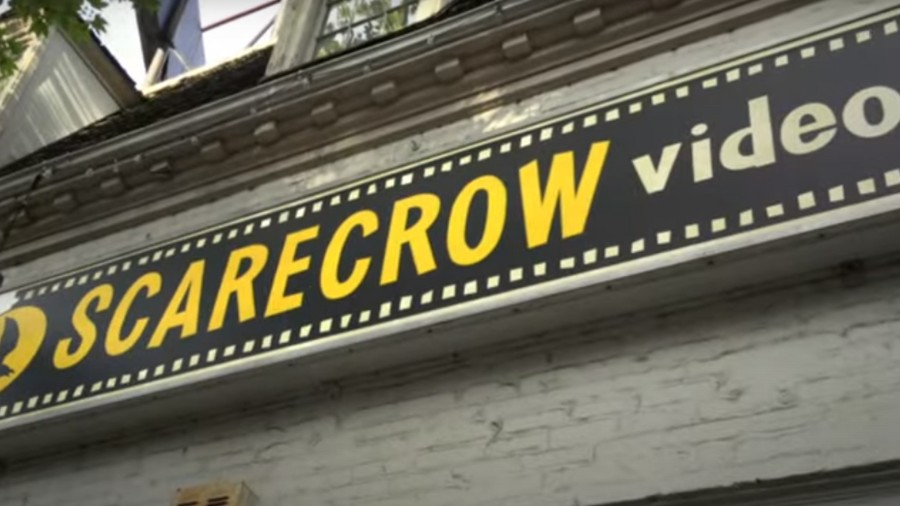A Communist mystery found hidden in a Seattle home
Sep 4, 2019, 10:30 AM | Updated: 1:10 pm
Found in a secret compartment in a Seattle home were fascinating wartime papers from the local outpost of a national fraternal organization called the International Workers Order. But also hidden were membership cards from the Communist Party of Washington State.
Both cards belonged to a man named Alex Gavridsky, who lived in the Beacon Hill house for 40 years.
Wartime history found in secret compartment in Seattle
What’s fascinating about the membership cards is that they are signed by Henry Huff, known to his friends as “Heinie,” who was chair for many years of the Washington State Communist Party.
Henry Huff
Huff worked in logging camps in southwest Washington and was a charter member of the state Communist Party in the 1920s. He was very active in the labor struggles of the 1930s and 1940s. Later, he was also later one of the so-called “Seattle Seven”
— seven labor and political leaders arrested under the Smith Act in September 1952. The Smith Act was used to prosecute suspected Communists and others for what were viewed as subversive activities (working to overthrow the government) but it came with a fair amount of political baggage, too.
Henry Huff recorded nearly 20 hours of oral history in the 1980s that are now part of the Tamiment Library archives at New York University and that are posted online.
On one of the recordings, Huff described his 1952 arrest in Portland.
“I got up and asked, ‘Who is it?,’ and they said, ‘It’s the Federal Bureau of Investigation. We want Henry Huff.’ I said, ‘Well, don’t get your shirts off.’ And so I went back and put on my bathrobe and took my time … Karly Larsen, Barbara Hartle and myself were brought to Seattle from the city of Portland in handcuffs and leg irons.”
“We remained in jail in Seattle, most of us, for only four or five days,” Huff continued, “in which time I received many, many letters expressing the utter shock and dismay at what most letters termed this kind of a frame-up against our people, and pledging their full support and money in our defense, and their greatest effort to help us defeat the forces who had arrested and jailed us.”
Referring to the others charged, who represented unions and civil rights groups, Huff continued, “These organizations were, of course, all on the Attorney General’s list as ‘subversive organizations,’ and which the monopolist capitalist ruling class wanted to destroy more than anything else that they had on their agenda at that time.”
All seven defendants were put on trial in federal court in Seattle in 1953. After six months of sometimes dramatic testimony, five of the defendants, including Henry Huff, were convicted (one had died by suicide during the trial, and one began cooperating with the FBI). Ultimately, the Smith Act was overturned by the US Supreme Court in 1957 and the convictions were vacated. Huff remained active with the Communist Party throughout his life, and he died in Seattle in 1986.
Who is Alex Gavridsky?
Though not a public figure like Henry Huff, Alex Gavridsky has his own intriguing history that reflects the region and the era. Gavridsky’s grandson, John Bartlett, shared his grandfather’s story after being contacted and shown images of the materials found in the secret compartment.
“I don’t think anybody knew about it,” Bartlett said by phone from his home in Spokane, referring to his grandfather’s Communist Party affiliation. “I doubt my mother [Alex Gavridsky’s daughter Helen] even knew about it.”
Bartlett speculates that his grandmother Fela, Alex Gavridsky’s wife, may also have been unaware. The two were both from the same village in Eastern Europe along the Polish-Russian frontier.
“I wonder if she knew anything?” Bartlett said. “I wonder why it was hidden? Maybe it was to keep my grandmother from finding it.”
John Barlett says that whether or not his grandfather’s Communist Party membership was a secret, the man understandably came by his radical labor beliefs and perhaps his Communist Party affiliation through decades of labor in some of the most dangerous industries of the early 20th century.
Bartlett says Gavridsky immigrated from Russia in the teens. He worked a series of hard labor jobs in the Eastern US and in Canada, and eventually found his way to Seattle where others from his hometown had settled in the early 1920s. He and his wife were married around that time and they bought the Beacon Hill house in 1930.
Along the way, Gavridsky survived the Butte Mining Disaster in Montana in 1917; worked as a miner in Alaska; and worked as a logger in Southwest Washington. Gavridsky also worked at the old Frye meat packing plant, and though he had moved on, he lost friends who died in the fire there in 1943 when the B-29 prototype crashed into the building near Boeing Field.
These were literally “rough and tumble” times, years before worker protections from anything like OSHA ever existed. John Bartlett says his grandfather lived through the toughest era to be a laborer, and this probably made him something of an activist, particularly during the 1930s. Gavridsky spent the bulk of his career as a longshoreman in Seattle, and he participated in the violent 1934 West Coast waterfront strike that made labor leader Harry Bridges famous.
“My grandfather was one of the guys that really got beaten up bad,” Bartlett said. “So I figured, if you got beaten up bad, you must’ve been an activist, you know?”
Communist Party in Washington
Jim Williams is a retired UW Tacoma professor. He says the Communist Party indeed had appeal to working people in the Northwest of that era, especially in dangerous industries such as where Alex Gavridsky was employed. The party was also radically progressive when it came to other social issues.
“If anybody can say anything good about the Communist Party, it was an organization that was way out in front on civil rights and civil liberties and national oppression these kinds of things,” Williams said. “And they were out there at a time when nobody — no other white organization was, so … you have to give the devil their due that they played a role in ending segregation and discrimination.”
And sure enough, the back of one of Alex Gavridsky’s Communist Party membership cards lists several then-radical stances — fighting against segregation, fighting for African-American equality — that are now mainstream.
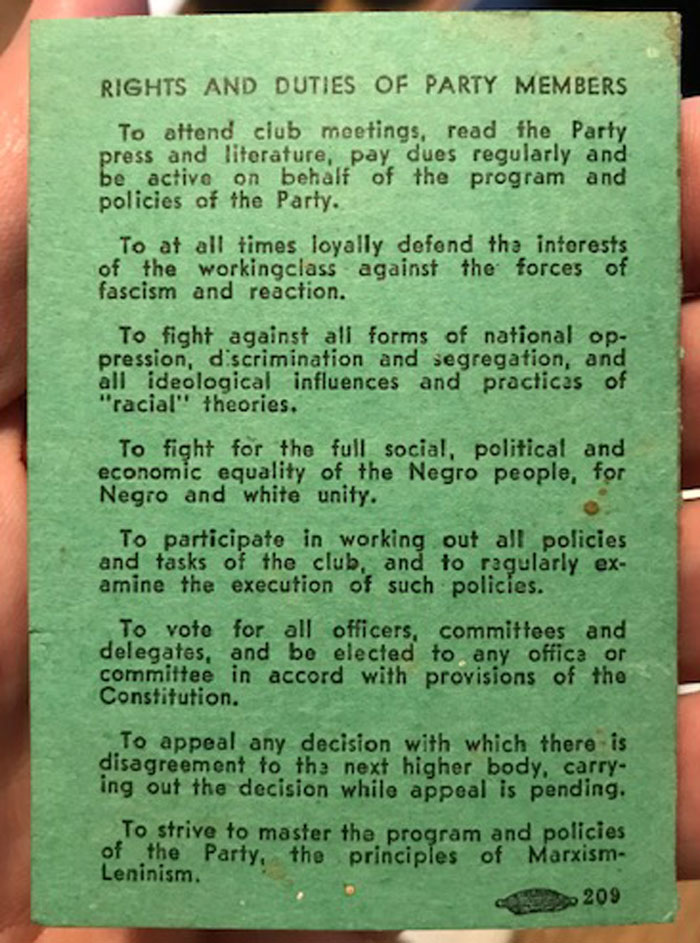
Setting aside pro-labor and pro-civil rights elements of Communism, those who were prosecuted under the Smith Act, and those accused of being Communists by people like Spokane’s Albert Canwell in Seattle in 1948, or US Senator from Wisconsin Joseph McCarthy a few years later, were often assumed to be working on behalf of the Soviet Union to overthrow the United States. This was at a time when nuclear weapons had made the Cold War a true life-and-death struggle beyond just a battle for superiority of differing economic or social systems.
John Bartlett doesn’t blanch when asked what could be considered an uncomfortable question: was his grandfather Alex Gavridsky seeking to overthrow the US government, or was he a loyal American working to radically change the system?
“I didn’t consider him disloyal … he [was] proud of his Russian heritage,” Bartlett said, also pointing out that his grandparents assimilated into American culture, both became US citizens, voted regularly, and had no desire to return to Russia.
“But you know, I don’t think he liked Nixon,” Bartlett said, chuckling. “But nobody else liked Nixon back then, either.”
Alex Gavridsky passed away in 1971. It’s still a mystery as to exactly why and when the “International Workers Order” materials and the Communist Party membership cards were hidden, though John Bartlett says that Stella Kalyk, who was secretary of the IWO and lived a few blocks away, was a friend of his grandparents.
Meanwhile, the Communist Party USA still has a Washington chapter with a membership roster of around a hundred people. State Chair Marc Brodine says the group is still active, still working to influence policies where they can.
“We continue to be a participant in movements to address climate change, to address economic and racial injustice, to fight for the rights of women and civil rights and equal rights for all people,” Brodine said by phone last week from Spokane.
What about those accusations of being pro-Soviet in those early years of the Cold War?
“We were certainly viewed as a pro-Soviet party in the sense of wanting to have détente and good relations, and work for peace in the world and have benefits for the workers of this country,” Brodine said. “But we were never acting on someone else’s behalf. We were acting on behalf of the interests of the workers of this country.”
And thanks to the discovery in Josh Rohr and Jeff Maggioli’s basement, and John Bartlett’s willingness to share his family’s story, the feel of that whole fraught era is brought life by the memories, and long-hidden papers, of a worker named Alex Gravidsky.

